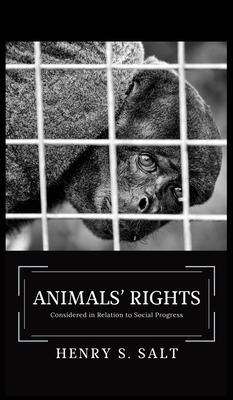Animals' Rights: Considered in Relation to Social Progress

Animals' Rights: Considered in Relation to Social Progress
"...it is ourselves, our own vital instincts, that we wrong, when we trample on the rights of the fellow-beings, human or animal, over whom we chance to hold jurisdiction."
Henry Stephens Salt was a noted ethical vegetarian, socialist, humanitarian and pacifist. It was Salt who influenced Gandhi's study of vegetarianism and non-violent protest. He is credited with being the first writer to argue explicitly in favor of animal rights. He was way ahead of his time in his approach to animal welfare. Henry Salt is indeed an interesting turn-of-the-century writer whose ideas have been greatly influential and whose books are still worth reading.Salt believed animals should be free to live their own lives and that humanity has a responsibility to treat them compassionately and justly.
CONTENTS: Prefatory Note Chapter I - The Principle of Animals' RightsChapter II - The Case of Domestic AnimalsChapter III - The Case of Wild AnimalsChapter IV - The Slaughter of Animals for FoodChapter V - Sport, or Amateur ButcheryChapter VI - Murderous MillineryChapter VII - Experimental TortureChapter VIII - Lines of ReformAppendix- Bibliography of the Rights of AnimalsThe object of the following essay is to set the principle of animals' rights on a consistent and intelligible footing, to show that this principle underlies the various efforts of humanitarian reformers, and to make a clearance of the comfortable fallacies which the apologists of the present system have industriously accumulated. While not hesitating to speak strongly when occasion demanded, I have tried to avoid the tone of irrelevant recrimination so common in these controversies, and thus to give more unmistakable emphasis to the vital points at issue. We have to decide, not whether the practice of fox-hunting, for example, is more, or less, cruel than vivisection, but whether all practices which inflict unnecessary pain on sentient beings are not incompatible with the higher instincts of humanity. I am aware that many of my contentions will appear very ridiculous to those who view the subject from a contrary standpoint, and regard the lower animals as created solely for the pleasure and advantage of man; on the other hand, I have myself derived an unfailing fund of amusement from a rather extensive study of our adversaries' reasoning. It is a conflict of opinion, wherein in time alone can adjudicate: but already there are not a few signs that the laugh will rest ultimately with the humanitarians. My t
PRP: 124.43 Lei
Acesta este Pretul Recomandat de Producator. Pretul de vanzare al produsului este afisat mai jos.
111.99Lei
111.99Lei
124.43 LeiLivrare in 2-4 saptamani
Descrierea produsului
"...it is ourselves, our own vital instincts, that we wrong, when we trample on the rights of the fellow-beings, human or animal, over whom we chance to hold jurisdiction."
Henry Stephens Salt was a noted ethical vegetarian, socialist, humanitarian and pacifist. It was Salt who influenced Gandhi's study of vegetarianism and non-violent protest. He is credited with being the first writer to argue explicitly in favor of animal rights. He was way ahead of his time in his approach to animal welfare. Henry Salt is indeed an interesting turn-of-the-century writer whose ideas have been greatly influential and whose books are still worth reading.Salt believed animals should be free to live their own lives and that humanity has a responsibility to treat them compassionately and justly.
CONTENTS: Prefatory Note Chapter I - The Principle of Animals' RightsChapter II - The Case of Domestic AnimalsChapter III - The Case of Wild AnimalsChapter IV - The Slaughter of Animals for FoodChapter V - Sport, or Amateur ButcheryChapter VI - Murderous MillineryChapter VII - Experimental TortureChapter VIII - Lines of ReformAppendix- Bibliography of the Rights of AnimalsThe object of the following essay is to set the principle of animals' rights on a consistent and intelligible footing, to show that this principle underlies the various efforts of humanitarian reformers, and to make a clearance of the comfortable fallacies which the apologists of the present system have industriously accumulated. While not hesitating to speak strongly when occasion demanded, I have tried to avoid the tone of irrelevant recrimination so common in these controversies, and thus to give more unmistakable emphasis to the vital points at issue. We have to decide, not whether the practice of fox-hunting, for example, is more, or less, cruel than vivisection, but whether all practices which inflict unnecessary pain on sentient beings are not incompatible with the higher instincts of humanity. I am aware that many of my contentions will appear very ridiculous to those who view the subject from a contrary standpoint, and regard the lower animals as created solely for the pleasure and advantage of man; on the other hand, I have myself derived an unfailing fund of amusement from a rather extensive study of our adversaries' reasoning. It is a conflict of opinion, wherein in time alone can adjudicate: but already there are not a few signs that the laugh will rest ultimately with the humanitarians. My t
Detaliile produsului








